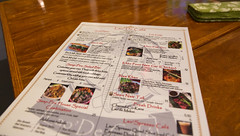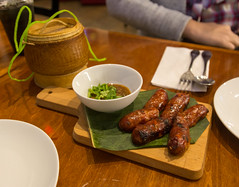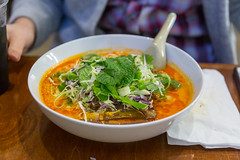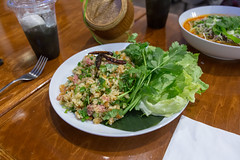(Update: While I adored Lao’De Café, they ended up among the restaurants that didn’t survive the pandemic shutdown, closing in 2020. They’ll be missed.)
A regular feature of my enjoyment of both cooking and Asian cuisine in general means that occasionally we’ve got to head down to Massachusetts on a run for ingredients. This time, it was a trip down to Penzey’s Spices (my favorite for getting high quality spices), then a trip over to the surprisingly affordable and expansive selection of Indian ingredients at Patel Bros in Waltham, followed by the inevitable trip to H-Mart in Burlington, MA for our Japanese and Korean groceries. After a rather successful trip to all three, we headed back home to New Hampshire, passing through Lowell, MA around dinner time.
As you can see from my other reviews around Lowell, it’s a neat little town, with one of the more rich and diverse histories. Named after industrial pioneer Francis Cabot Lowell, Lowell was originally founded as a mill town, replacing farmers’ field in Chelmsford MA with a combination of textile mills, factories, and canals as one of the nation’s earliest industrial centers. After a lull in the mid-20th century as, like almost every other mill town in New England, things moved to the South and overseas, Lowell hit a second wave of development in the late 20th century with a combination of education (Umass-Lowell), computers (Wang was founded in Lowell), and then and interesting demographic change as it became a major center for Southeastern Asian immigrants, forming substantial Cambodian, Laos, Vietnamese, and Indian communities. This gives it a very interesting mix of everything from old school blue-collar diners (like The Owl), Portuguese food (Cavaleiros), over a dozen good Cambodian places , and even a handful of Laos places. Which brings us to Lao’De Café.
Lao’De Café originally showed up on my radar because Gary over at PigTrip has mostly hung up his hat as a BBQ reviewer, he continues to post a bunch of nice food pictures and recommendations to his facebook feed, and a picture of his of Sai Oua (a Lao dish of seared pork and tomato chutney… we’ll get back to that in a bit) had my mouth watering. So we decided to check it out. It’s not a large place, basically a counter and a small dining room on Merrimack St in downtown Lowell (with the usual minor drama accompanying finding parking in Lowell). But after a short search for a spot (even on a fairly quiet Saturday early evening), we settled in at Lao’De Café and perused the menu.
While I’ve eaten a rather lot of Thai, Vietnamese, and Cambodian food (see above; the whole reason we came down to MA this time was buying a boatload of Asian ingredients), I’m not all that familiar with Lao food, but the menu was well-presented and laid out, and the concepts are basically similar to nearby Southeastern Asian cuisines; if you are happy at a Thai, Vietnamese, and Cambodian place, you’ll find something good here.
Indeed, we started off on a delicious footing with our beverage choice: the house specialty beverage, the “Charred Co-Kane”. A light-tasting but dark-colored drink made from a combination of charred coconut and cane sugar (with bits of soft boiled coconut flesh served floating in the beverage), this comes out looking like iced coffee, but having a really rich roasted coconut flavor. The sugar adds a nice caramel note, and while a bit sweet, this was a great counterpoint to the spicy food.
Then we were into the actual food. Based upon Gary’s recommendation, I was unable to resist the Sai Oua (pronounced “say wah”). On the face of it, this is a simple dish of grilled sausage, but when you dig into it, there’s a lot to like here. The Lao-style pork sausage has a very herbal note to it, and when grilled it takes up a very nice crispiness from the grill, making for a particularly good “crisp pork” taste. The Jaew Mak Len (a Lao tomato chutney) is a very nice accompanying sauce with some heat and enough complexity that I need to investigate it a bit more. Add a bit of sticky rice, and each little bite is a bit of spicy, herbal pork complexity with some nice tang from the sauce and some starch from the rice. This is a thoroughly enjoyable appetizer.
Next was Carol’s Khao Poon Nam Gai: a Lao style chicken and noodle soup with red curry, coconut milk, sprouts, and mint, with some “Pork Blood Cake” added. Everything about the base soup was hitting on all cylinders: tender shredded chicken, a hot and fragrant red curry, toothsome noodles, a rich and hearty broth, and some good texture and flavor notes from the sprouts. This reminded me of many of the things I like about Thai red curries, Thai tom kha soup, and Vietnamese phở all bundled into one soup. However, neither of us really thought the “pork blood cake” added anything (we’re not squeamish; indeed I adore a good black pudding, it just didn’t seem to add much).
For my entree, I got the Nam Khao: crispy rice with fermented Nam sausage and red curry pasted, served up with fresh cilantro and lettuce. Eaten like a lettuce wrap, this is like everything I love about Vietnamese Cha Giao (eggrolls), but done in a deconstructed form. You know when you have a Korean Gopdol Bibimbap in a stone bowl and you end up with all sorts of crunchy rice bits that soak of the sauce? The rice has that perfect “halfway crisp” texture. The fermented Nam sausage is a surprisingly tangy pork sausage with more than a little spice and a nice “pickled meat” flavor. Wrapping everything up in a leaf of lettuce gives you a nice flavor and texture hit with each bite: pork, starch, two different types of crunch, some herbal notes from the cilantro. I adored this dish.
Overall, I truly loved Lao’De Café. The food is flavorful and makes great use of all the Southeastern Asian flavors and textures I love. The prices are affordable, the menu well-presented, and the owner even came over to make sure we understood the food and were having a good time. I’m looking forward to my March trip to Metheun, MA so I can hopefully stop in and try more of their menu.








